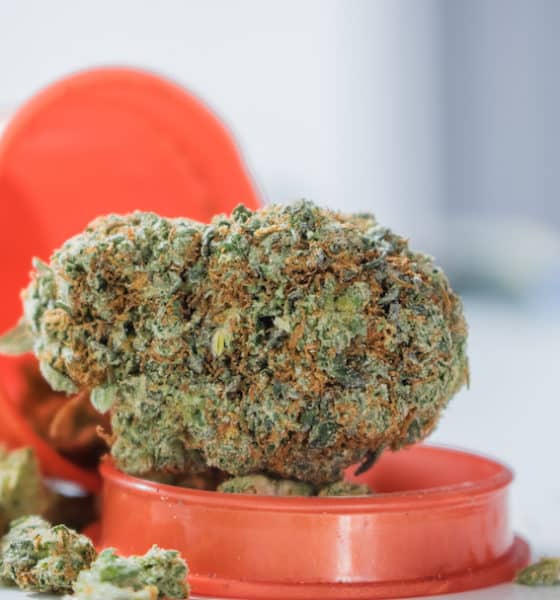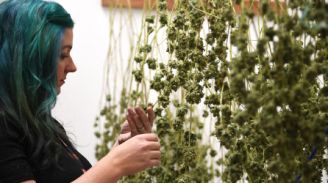Though still in its infancy, new research shows some promising results when it comes to cannabinoids’ effect on sleep apnea. A study published in the medical journal Sleep this year confirms that a synthetic cannabinoid can lessen the sometimes dangerous symptoms of sleep apnea. To better understand this study, and what it could potentially mean for sleep apnea patients, we spoke with Dr. Jerald Simmons, MD.
What Is Sleep Apnea?
Sleep apnea is a common sleep disorder. The American Sleep Apnea Association estimates that 22 million Americans have sleep apnea in varying degrees of severity.
People with sleep apnea experience intermittent breathing after they fall asleep. Dr. Jerald Simmons, MD is the founder of Comprehensive Sleep Medicine Associates. He is board certified in Sleep Medicine, Epilepsy and Neurology from Stanford, and spends much of his time treating patients with sleep apnea.
Dr. Simmons described sleep apnea to High Times as an unstable condition that changes depending on which sleep stage you’re in.
“Sleep apnea is a condition where when you’re asleep the airway becomes more narrow,” he explained, “The muscles of the throat relax, and it’s harder for people to breathe. As the airway becomes more narrow, a vacuum gets created in the back of the throat.”
This vacuum is what leads to snoring, and in severe cases, the throat closes completely. Sleep apnea can completely stop you from breathing.
Sleep apnea produces a host of medical problems. According to Dr. Simmons, it can cause strokes, high blood pressure, diabetes, heartburn, fatigue and headaches. Additionally, having millions of poorly rested people on the roads is a safety hazard.
Treating Sleep Apnea Can Be Difficult
“There are a variety of ways of treating this that are basically mechanical methods,” Dr. Simmons clarified. In order to prevent the muscles of the throat from relaxing and potentially closing, patients use either a sleep apnea mask or a dental appliance.
The mask covers your nose and is attached to a machine that consistently moves air to the back of your throat. The dental appliance pushes the jaw forward. Both prevent the muscle relaxation that closes the airway. Another less common option sleep-apnea surgery.
Excluding surgery, which can be costly, these two common treatments can be cumbersome and difficult to use. In many cases, sleep apnea patients either don’t use their mask or dental appliance or use it incorrectly. Today, there are no oral medications that you can take for sleep apnea.
The Study On Cannabinoids and Sleep Apnea
New research shows that an oral cannabinoid medication could soon become a reality.
This study is called the “PACE Clinical Trial: The Effects of Dronabinol in Obstructive Sleep Apnea.” PACE stands for Pharmacotherapy of Apnea by Cannabimimetic Enhancement.
Scientists from the University of Chicago and Northwestern University took 73 sleep apnea patients, First, they tested the severity of their Obstructive Sleep Apnea, meaning that they only dealt with muscular sleep apnea. Conditions ranged from moderate to severe, meaning that the throat closes completely. They also surveyed the participants on their fatigue levels prior to beginning treatment.
Then, researchers administered placebo pills, a low dose of cannabinoidmedication and a high dose of cannabinoid medication to three separate groups. They used dronabinol, which is a synthetic cannabinoid already approved by the FDA to help chemotherapy patients cope with appetite loss.
Though researchers have conducted other studies on cannabinoids and sleep apnea, this one was the most legitimate. “It was done in a proper experimental fashion that, just like any other pharmaceutical compound that would be tested,” Dr. Simmons said.
The Study’s Findings Were Striking
The study found that dronabinol significantly helped for sleep apnea patients. They reported less fatigue and fewer symptoms than the placebo group. Not only that but the higher the dose, the better the patients did.
Significantly, those with the most severe symptoms benefitted the most from the cannabinoid.
Patients also showed the biggest reduction in symptoms at the point in their sleep cycle when they’re usually the most acute. Dr. Simmons explained, “The study showed was that the benefit was most significant in REM sleep, and it was most significant in terms of complete apnea, the ones where the airway is completely blocked.”
The Future of Sleep Apnea Medication
We are still a long way from an oral cannabinoid medication for sleep apnea. Though these are impressive findings that will hopefully promote further cannabinoid research, it is only one study.
On the other hand, the FDA has already approved dronabinol. This means that getting the drug to market would be a less lengthy process than usual.
Sensitive to the difficulty of this condition, Dr. Simmons is hopeful that more testing will back this initial study. “There are no medications available that people can take to treat this, so if there’s a medication that works it would be very helpful. It could help decrease these other issues that sleep apnea can cause.”
An oral medication would make a big difference in the lives and health of the millions of people with sleep apnea.















